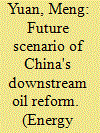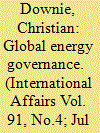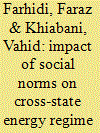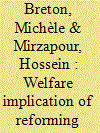|
|
|
Sort Order |
|
|
|
Items / Page
|
|
|
|
|
|
|
| Srl | Item |
| 1 |
ID:
143020


|
|
|
|
|
| Publication |
Gurgaon, LexisNexis, 2015.
|
| Description |
xvi, 203p.hbk
|
| Standard Number |
9789351436829
|
|
|
|
|
|
|
|
|
|
|
|
Copies: C:1/I:0,R:0,Q:0
Circulation
| Accession# | Call# | Current Location | Status | Policy | Location |
| 058428 | 320.40954/MOD 058428 | Main | On Shelf | General | |
|
|
|
|
| 2 |
ID:
186678


|
|
|
|
|
| Publication |
Gurgaon, LexisNexis, 2015.
|
| Description |
xvi, 203hbk
|
| Standard Number |
9789351436829
|
|
|
|
|
|
|
|
|
|
|
|
Copies: C:1/I:0,R:0,Q:0
Circulation
| Accession# | Call# | Current Location | Status | Policy | Location |
| 060212 | 551.6/MOD 060212 | Main | On Shelf | General | |
|
|
|
|
| 3 |
ID:
176766


|
|
|
|
|
| Summary/Abstract |
Improving energy supply efficiency and quality is regarded as a key pathway to shifting towards a fully sustainable energy system. To address the low efficiency and high emissions in the downstream oil industry caused by the problem of vertically integrated monopoly, the Chinese government is making an effort to promote a multiproduct pipeline network reform. The fundamental and indispensable step for this goal is the pipeline network interconnectivity. This paper quantifies the energy-environmental impacts of the pipeline network interconnectivity reform on China's downstream oil supply chain to 2030. An integrated framework is developed to obtain the detailed design-scale information required for assessment, introducing demand forecasting and demand reallocation into a pipeline network optimal planning model. The model is formulated as a fuzzy mixed integer linear programming that optimizes the infrastructure development scheme and supply chain operation plan simultaneously while taking into account demand uncertainty. The results show that, compared with the baseline, the pipeline interconnectivity reform could reduce yearly energy consumption and CO2 emissions by 9.7–19.8% and 12.5–17.9%, respectively. It is shown that this reform policy could overcome infrastructure constraints, increase pipeline utilization, and improve both energy and environmental performance. The proposed framework can be a theoretical guideline for policymakers within and beyond China.
|
|
|
|
|
|
|
|
|
|
|
|
|
|
|
|
| 4 |
ID:
140271


|
|
|
|
|
| Summary/Abstract |
It is widely accepted that the rising power of the BRIC countries—Brazil, Russia, India and China—has the potential to re-shape the international system. However, little attention has been given to the BRICs’ role in a growing area of strategic importance: global energy governance. While global governance scholars now argue that the international energy architecture requires substantive reform to keep pace with the rapid transformations in global energy markets, largely driven by the BRICs, it is not clear what role these countries will play in future governance arrangements. Drawing on recent scholarship in global governance and international negotiations, interviews with G20 energy officials, and the observations of the author, a past delegate to G20 negotiations, this article examines whether the BRICs as a coalition have the capacity and willingness to drive substantive global energy governance reform. In doing so, it highlights the problems with the BRICs as a coalition on energy and considers the prospects for energy reform in light of China's increasing engagement with energy governance ahead of it hosting the G20 Summit in 2016.
|
|
|
|
|
|
|
|
|
|
|
|
|
|
|
|
| 5 |
ID:
180104


|
|
|
|
|
| Summary/Abstract |
We present a survey study that explores two experimental analysis: first, a cross-country norms effect on petition signing, and second, a cross-state comparison, focusing on clean energy adaptation instead of fossil fuel energy. In the first study, we use energy consumption information from the US, EU, and China. Using the first study as a pilot, we redesigned the second experiment by providing energy utilization for Arizonian and New Mexican to validate our norms by comparing their states' green energy consumption to the pioneer states separately. The results of the research point out that social norms can effectively influence the participants in different angles. The attendants are more likely to sign a petition—by seven percent—in favor of clean energy act when they have been provided with additional information. This research highlights that not only social norms could be compelling individuals’ behavior, but also that they are sensitive to the types of information which are disclosed to them.
|
|
|
|
|
|
|
|
|
|
|
|
|
|
|
|
| 6 |
ID:
167181


|
|
|
|
|
| Summary/Abstract |
By utilizing the theory of Strategic Action Fields (SAFs), the present article explains how a new meso-level social order seems to have emerged in Mexico as a result of the paramilitarization of organized crime, militarization of security, and the opening of Mexico’s energy sector to private investment. This work describes the transformation of Mexico’s energy field after a process of major constitutional and economic changes that were the consequence of a security crisis and an agenda of energy reform for which the so-called ‘drug war’ was a key underlying foundation.
|
|
|
|
|
|
|
|
|
|
|
|
|
|
|
|
| 7 |
ID:
149861


|
|
|
|
|
| Summary/Abstract |
Reforming energy consumption subsidies, in particular for fossil fuels, has been frequently referred to as a quick-win policy to enhance environmental mitigation. In addition, the removal of such subsidies may release a sizeable portion of a country's national budget for use on more productive targets. One of the most recognized challenges of such reform is “selling” the new energy prices to citizens, particularly those with a more fragile purchasing power. Several empirical and technical studies have prescribed that the reform might be supported by a direct compensation mechanism in order to ensure feasibility.
|
|
|
|
|
|
|
|
|
|
|
|
|
|
|
|
| 8 |
ID:
127914


|
|
|
|
|
| Publication |
2014.
|
| Summary/Abstract |
While physical interventions such as external wall cladding can improve the energy efficiency of domestic properties, how residents think about and respond to such interventions can influence both their uptake and impact on the household's energy use. The present research investigated what residents living within deprived communities in Yorkshire and the Humber (United Kingdom) thought about a number of household energy efficiency interventions proposed as part of a project known as "The BIG Energy Upgrade". The Theory of Planned Behaviour was used as a framework for investigating residents' beliefs. Residents generally felt positive about the proposed interventions and expected that they would lead to financial savings, improve the appearance and warmth of their homes, and sense of pride in the local community. However, while residents intended to adopt energy efficiency interventions if offered them, they were less willing to personally invest in them. Home ownership and the belief in humans' ability to tackle climate change were found to predict willingness to invest. These findings help to understand responses to initiatives that seek to improve the energy efficiency of hard-to-treat homes.
|
|
|
|
|
|
|
|
|
|
|
|
|
|
|
|
|
|
|
|
|